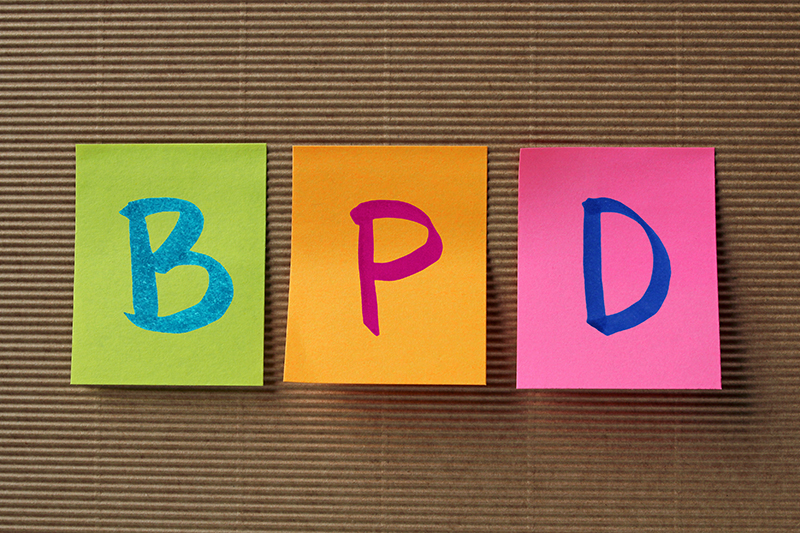There are many complex things happening in the BPD brain, and researchers are still untangling what it all means. But in essence, if you have BPD, your brain is on high alert. Things feel more scary and stressful to you than they do to other people. Your fight-or-flight switch is easily tripped, and once it’s on, it hijacks your rational brain, triggering primitive survival instincts that aren’t always appropriate to the situation at hand.
This may make it sound as if there’s nothing you can do. After all, what can you do if your brain is different? But the truth is that you can change your brain. Every time you practice a new coping response or self-soothing technique you are creating new neural pathways. And the more you practice, the stronger and more automatic these pathways will become .
So don’t give up!
With time and dedication, you can change the way you think, feel, and act.
Neuroplasticity, the brain healing and changing the way you both think and behave, is cutting edge neuro -science and producing fantastic results.
People with BPD tend to be extremely sensitive, they experience intense emotional pain. Some describe it as feeling like an exposed nerve ending.The powerful emotions and sensitivity of people with BPD can be exciting and intense.
Small things can trigger intense reactions. And once upset, you have a hard time calming down.
It’s easy to understand how this emotional volatility and inability to self-soothe leads to relationship turmoil and impulsive—even reckless—behaviour. When you’re in the throes of overwhelming emotion, you’re unable to think straight and stay grounded. You may say hurtful things or act out in dangerous or inappropriate ways that make you feel guilty and ashamed later on. It’s a painful cycle that can feel impossible to escape. But it is not.
People with BPD can be dramatic and charismatic,and they are often quite caring and understanding. Nevertheless, interacting with people with BPD is like trying to hold on to the sun,the emotional intensity of a person with BPD can singe and char relationships.
BPD clouds your sense of who you are. Your self-image, goals, and even your likes and dislikes may change frequently in ways that feel confusing and unclear.
BPD is treatable.
In fact, the long-term prognosis for BPD is better than those for depression and bipolar disorder.
Most people with BPD can and do get better—and they can do so fairly rapidly with the right therapy and support.
Healing is a matter of breaking the dysfunctional patterns of thinking, feeling, and behaving that are causing you difficulty and distress. It’s not easy to change lifelong habits. Choosing to pause, reflect, and then act in new ways will feel unnatural and uncomfortable at first. But with time you’ll form new habits that help you maintain your emotional balance and stay in control.
Self Help Tip 1 – Calming the emotional storm
As someone with BPD, you’ve probably spent a lot of time fighting your impulses and emotions, so acceptance can be a tough thing to wrap your mind around. But accepting your emotions doesn’t mean approving of them or resigning yourself to suffering. All it means is that you stop trying to fight, avoid, suppress, or deny what you’re feeling. Giving yourself permission to have these feelings can take away a lot of their power.
Try to simply experience your feelings without judgement or criticism. Let go of the past and the future and focus exclusively on the present moment.
Start by observing your emotions, as if from the outside.
Watch as they come and go (it may help to think of them as waves).
Focus in on the physical sensations that accompany your emotions.
Tell yourself that you accept what you’re feeling right now.
Remind yourself that just because you’re feeling something doesn’t mean it’s reality.
Do something that stimulates one or more of your senses.
Engaging your sense is one of the quickest and easiest ways to quickly self-soothe. You will need to experiment to find out which sensory-based stimulation works best for you. You’ll also need different strategies for different moods. What may help when you’re angry or agitated is very different from what may help when you’re numb or depressed. Here are some ideas to get started:
Touch. If you’re not feeling enough, try running cold or hot (but not scalding hot) water over your hands; hold a piece of ice; or grip an object or the edge of a piece of furniture as tightly as you can. If you’re feeling too much, and need to calm down, try taking a hot bath or shower; snuggling under the bed covers, or cuddling with a pet.
Taste. If you’re feeling empty and numb, try sucking on strong-flavored mints or candies, or slowly eat something with an intense flavor, such as salt-and-vinegar chips. If you want to calm down, try something soothing such as hot tea or soup.
Smell. Light a candle, smell the flowers, try aromatherapy, spritz your favorite perfume, or whip up something in the kitchen that smells good. You may find that you respond best to strong smells, such as citrus, spices, and incense.
Sight. Focus on an image that captures your attention. This can be something in your immediate environment (a great view, a beautiful flower arrangement, a favorite painting or photo) or something in your imagination that you visualize.
Sound. Try listening to loud music, ringing a buzzer, or blowing a whistle when you need a jolt. To calm down, turn on soothing music or listen to the soothing sounds of nature, such as wind, birds, or the ocean. A sound machine works well if you can’t hear the real thing.
Reduce your emotional vulnerability
You’re more likely to experience negative emotions when you’re run down and under stress. That’s why it’s very important to take care of your physical and mental well-being.
Take care of yourself by:
- Avoid mood-altering drugs
- Eating a balanced, nutritious diet
- Getting plenty of quality sleep
- Exercising regularly
- Minimizing stress
- Practising relaxation techniques
Self Help Tip 2 – Learn to control impulsivity and tolerate distress
The calming techniques discussed above can help you relax when you’re starting to become derailed by stress. But what do you do when you’re feeling overwhelmed by difficult feelings? This is where the impulsivity of borderline personality disorder (BPD) comes in. In the heat of the moment, you’re so desperate for relief that you’ll do anything, including things you know you shouldn’t—such as cutting, reckless sex, dangerous driving, and binge drinking. It may even feel like you don’t have a choice.
Moving from being out of control of your behavior to being in control.
It’s important to recognize that these impulsive behaviors serve a purpose. They’re coping mechanisms for dealing with distress. They make you feel better, even if just for a brief moment. But the long-term costs are extremely high.
Regaining control of your behaviour starts with learning to tolerate distress. It’s the key to changing the destructive patterns of BPD. The ability to tolerate distress will help you press pause when you have the urge to act out. Instead of reacting to difficult emotions with self-destructive behaviours, you will learn to ride them out while remaining in control of the experience.
A grounding exercise to help you pause and regain control.
Once the fight-or-flight response is triggered, there is no way to “think yourself” calm. Instead of focusing on your thoughts, focus on what you’re feeling in your body. The following grounding exercise is a simple, quick way to put the brakes on impulsivity, calm down, and regain control. It can make a big difference in just a few short minutes.
Find a quiet spot and sit in a comfortable position.
Focus on what you’re experiencing in your body. Feel the surface you’re sitting on. Feel your feet on the floor. Feel your hands in your lap.
Concentrate on your breathing, taking slow, deep breaths. Breathe in slowly. Pause for a count of three. Then slowly breathe out, once more pausing for a count of three. Continue to do this for several minutes.
In case of emergency, distract yourself.
Self Help Tip 3 – Improve your interpersonal skills
If you have borderline personality disorder (BPD), you’ve probably struggled with maintaining stable, satisfying relationships, including with lovers, co-workers, and friends. This is because you have trouble stepping back and seeing things from other people’s perspective. You tend to misread the thoughts and feelings of others, misunderstand how others see you, and overlook how they’re affected by your behaviour. It’s not that you don’t care, but when it comes to other people, you have a big blind spot. Recognising your interpersonal blind spot is the first step. When you stop blaming others, you can start taking steps to improve your relationships and your social skills.
Check your assumptions
When you’re derailed by stress and negativity, as people with borderline personality disorder often are, it’s easy to misread the intentions of others. If you’re aware of this tendency, you can check your assumptions. Remember, you’re not a mind reader! Instead of jumping to conclusions (usually negative), consider alternative meaning and motivations. For example, let’s say your partner was abrupt with you on the phone and you’re feeling insecure and afraid they’ve lost interest in you.
Stop to consider alternative explanations. Maybe your partner is under pressure at work. Maybe he’s having a stressful day. Maybe he hasn’t had his coffee yet. There are many different possibilities.
Ask the person to clarify their intentions. One of the simplest ways to check your assumptions is to ask the other person what they’re thinking or feeling. Double check what they meant by their words or actions. Instead of asking in an accusatory manner, try a softer approach: “I could be wrong, but it feels like…” or “Maybe I’m being overly sensitive, but I get the sense that…”
Put a stop to projection
Do you have a tendency to take your negative feelings and project them on to other people? Do you lash out at others when you’re feeling bad about yourself? Does feedback or constructive criticism feel like a personal attack? If so, you may have a problem with projection.
To fight projection, you’ll need to learn to apply the brakes—just like you did to curb your impulsive behaviour. Tune in to your emotions and the physical sensations in your body. Take note of signs of stress: rapid heart rate, muscle tension, sweating, nausea, light-headed.
When you’re feeling this way, you’re likely to go on the attack and say something you’ll regret later. Pause and take a few slow deep breaths. Then ask yourself the following three questions:
- Am I upset with myself?
- Am I feeling ashamed or afraid?
- Am I worried about being abandoned?
If the answer is yes, take a conversation break. Tell the other person that you’re feeling emotional and would like some time to think before discussing things further.
Take responsibility for your role
Finally, it’s important to take responsibility for the role you play in your relationships. Ask yourself what you are doing that may be contributing to problems. How do your words and behaviours make your loved ones feel? Are you falling into the trap of seeing the other person as either all good or all bad? As you make an effort to put yourself in other people’s shoes, give them the benefit of the doubt, and reduce your defensiveness, you’ll start to notice a difference in the quality of your relationships.
At Borderline Personality Disorder Birmingham, you have a safe space where you can start working through your relationship and trust issues and explore new coping techniques and ways of being.It’s important to find a therapist you feel safe with—someone who seems to get you and makes you feel accepted and understood. Make a commitment to therapy. You may start out thinking your therapist is going to be your saviour, only to be disillusioned . Remember that these swings from idealisation to demonisation are a symptom of BPD. It is important to commit to therapy and allow the relationship to grow. And keep in mind that change, by its very nature, is uncomfortable. If you don’t ever feel uncomfortable in therapy, you’re probably not progressing.





